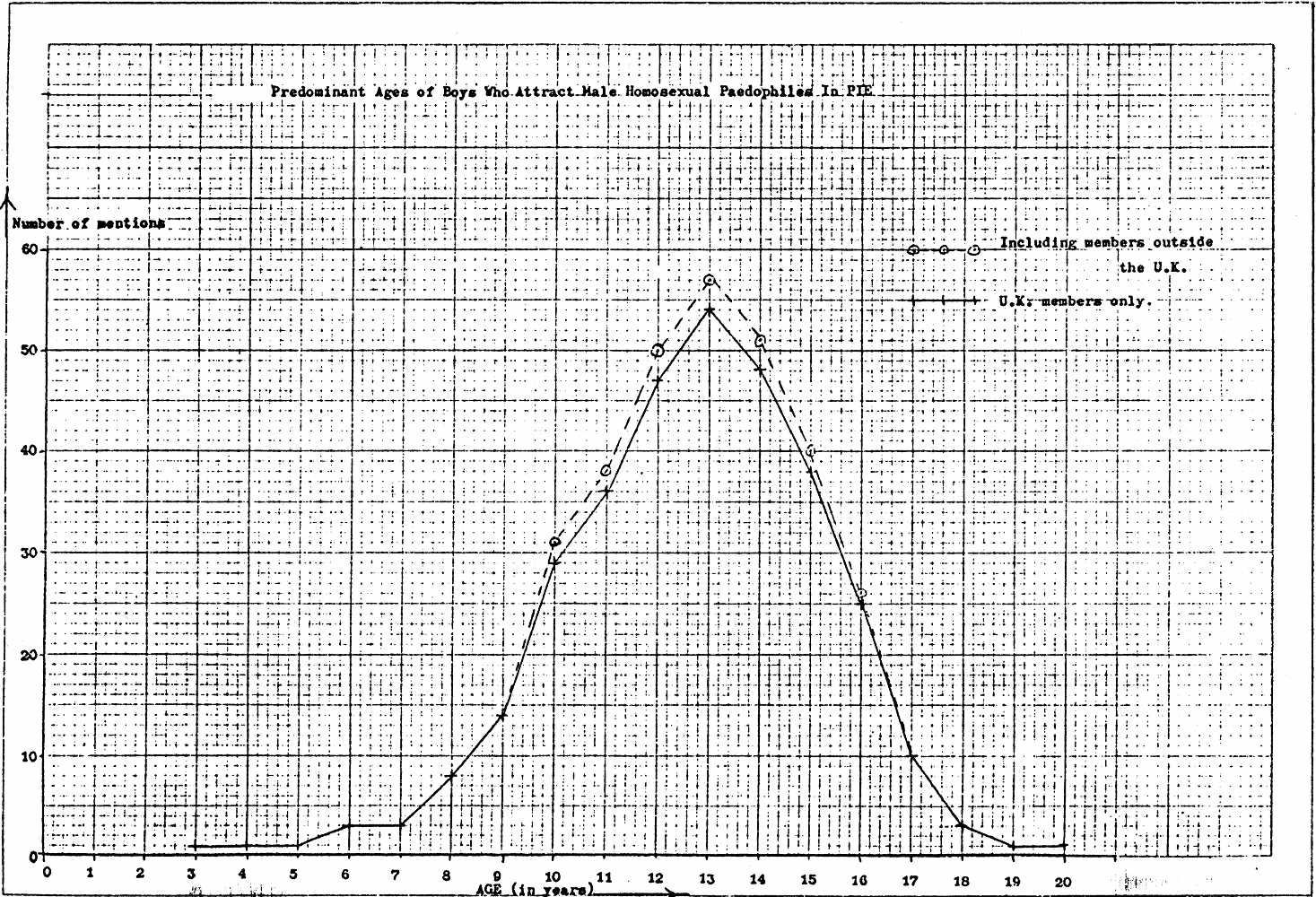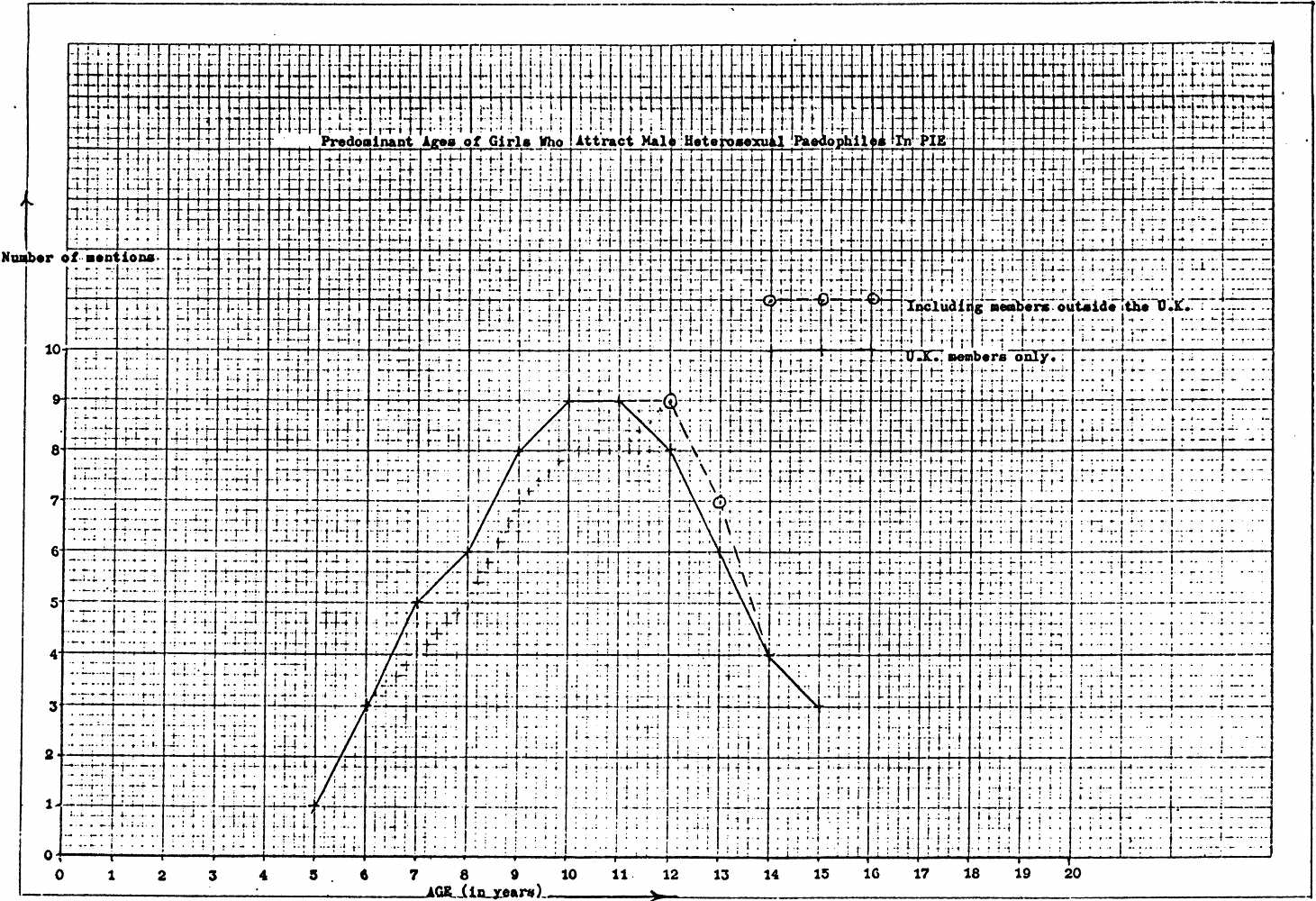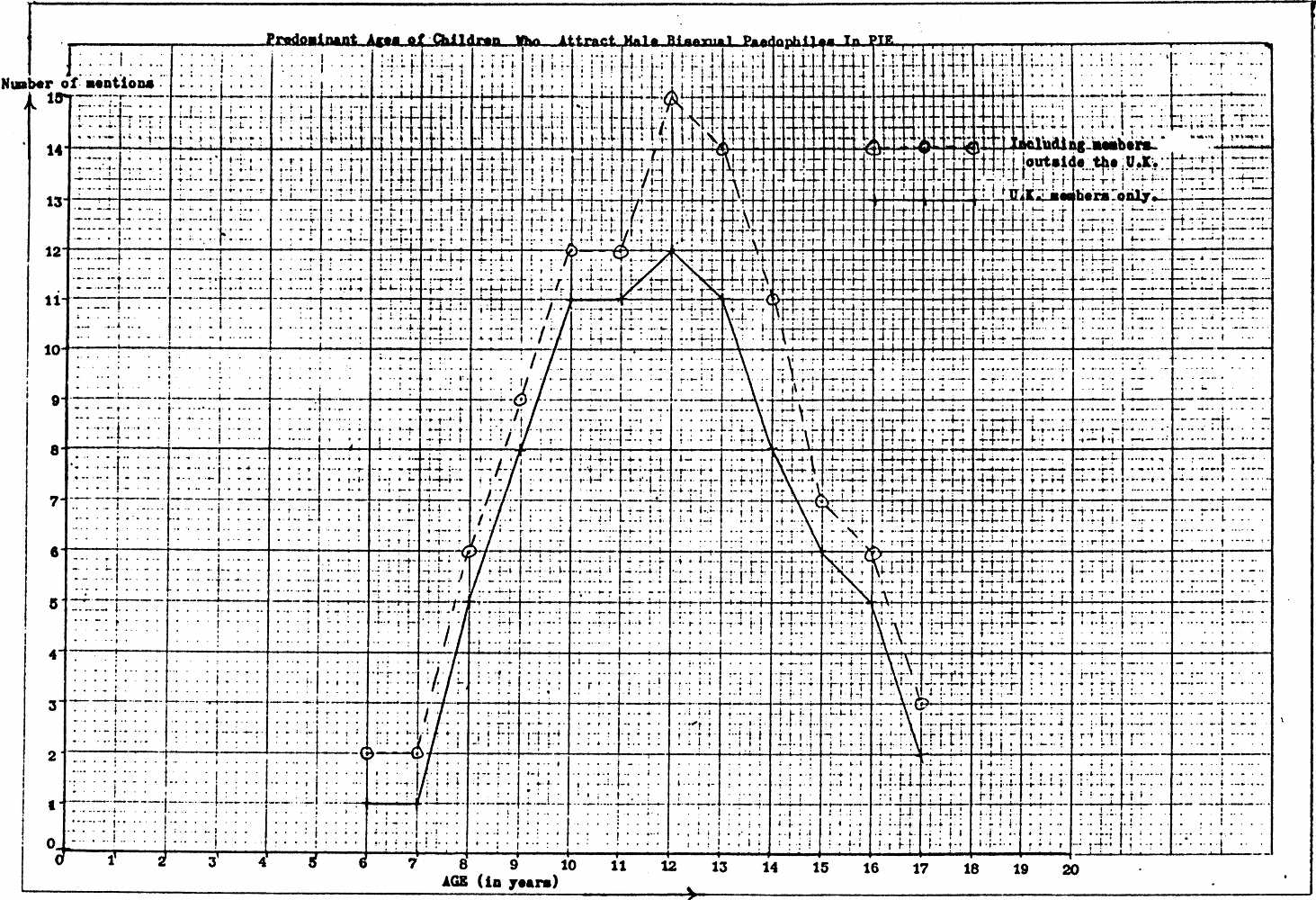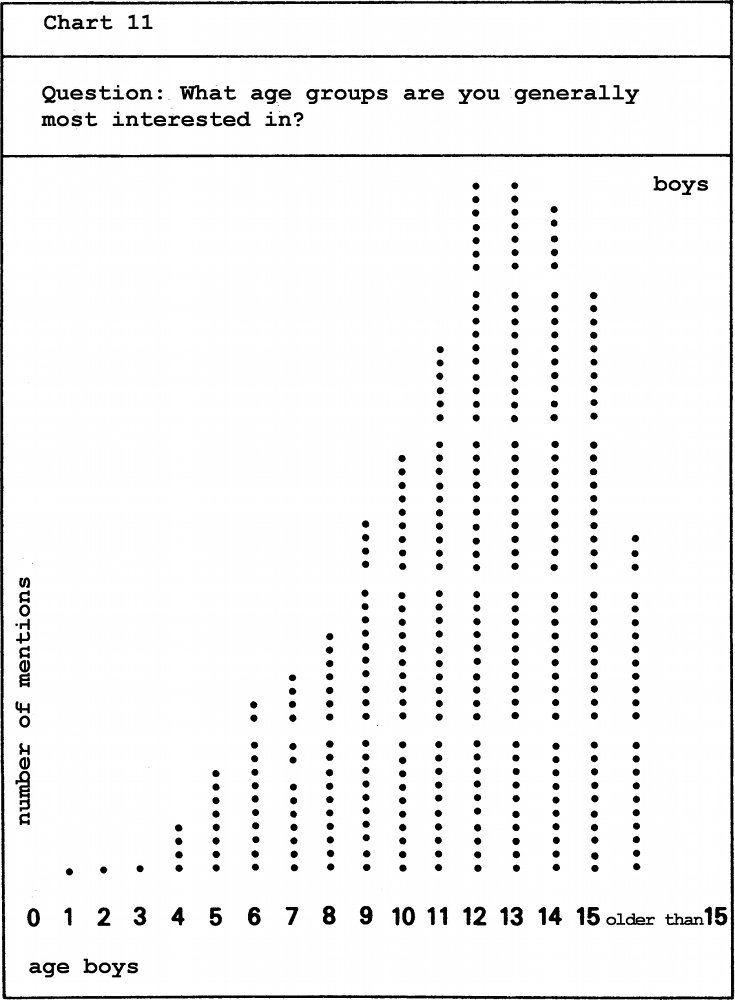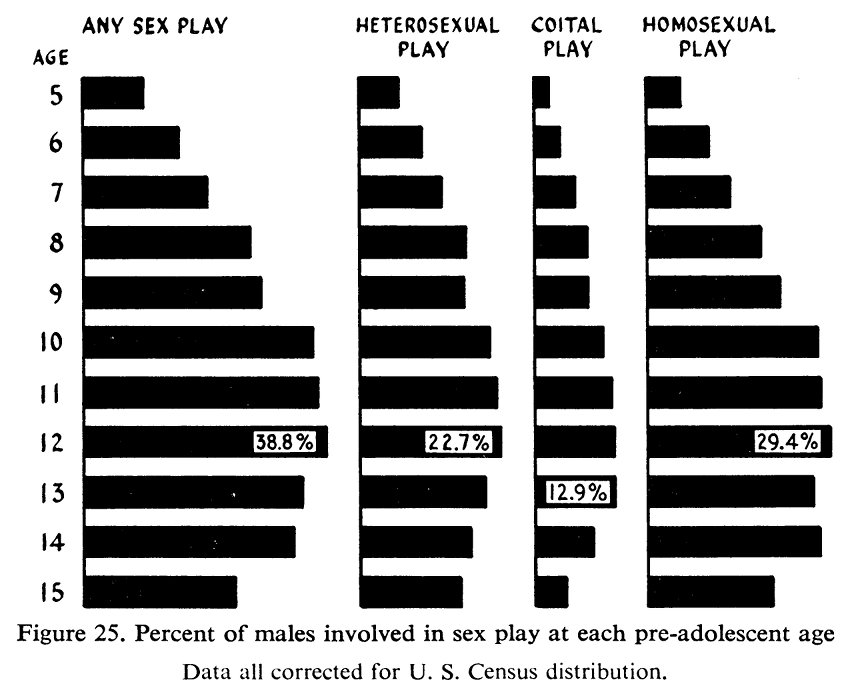Paedophile Information Exchange survey of members (texte intégral)
Texte intégral de l’enquête publiée en 1976 par le groupe britannique Paedophile Information Exchange, sous le titre Paedophile Information Exchange survey of members (« Enquête du Paedophile Information Exchange auprès de ses membres »).
Si vous possédez des droits sur ce document
et si vous pensez qu’ils ne sont pas respectés,
veuillez le faire savoir à la direction de BoyWiki,
qui mettra fin dès que possible à tout abus avéré.
| PIE c/o RELEASE, 1 ELGIN AVENUE, LONDON W9. | August 1976 |
The following questionnaire was sent from approximately the end of July 1975 onwards to all new members and was also sent out with Newsletter No.7 to all existing members.
QUESTIONNAIRE:
Please help us by completing the following questionnaire. There is no obligation to fill in this section or answer all of the questions.
Are you paedophile? Yes/No *
Are you male or female? _ _ _ _ _ _ _ _ _ _
Are you married or single? _ _ _ _ _ _ _ _ _ _
What is your age? _ _ _ _ _ _ _ _ _ _ _ _ _ _ _ _
I like girls / boys / both boys and girls *
Are you exclusively paedophile? Yes/No *
What is the exclusive or dominant age range of children which attracts you most? _ _ _ _ _ _ _ _ _ to _ _ _ _ _ _ _ _ _ _
What was your first sexual experience (Heterosexual, Homosexual, Masturbation)? _ _ _ _ _ _ _ _ _ _ _ _ _ _ _ _ _ _ _ _ _ _ _ _ _ _ _
At what age was that experience? _ _ _ _ _ _ _ _ _ _ _ _ _ _ _ _ _
Data from the returned questionnaires was tabulated on the 29th of March 1976, after approximately eight months had elapsed.
RESULTS
| Total membership as on 29.3.76 | = | 127 |
| Total U.K. membership on 29.3.76 | = | 114 (90%) |
| The Sample: | Total number of paedophiles in the sample | = | 96 |
| Total number of U.K. paedophiles | = | 87 (91%) |
| U.K. | Total | ||||
| Number | Percentage | Number | Percentage | ||
| Female paedophiles (both lesbian) | = | 2 | 2.3% | 2 | 2.1% |
| Male homosexual paedophiles | = | 60 | 69.0% | 64 | 66.7% |
| Male bisexual paedophiles | = | 15 | 17.2% | 18 | 18.8% |
| Male heterosexual paedophiles | = | 10 | 11.5% | 12 | 12.5% |
Data For Female Paedophiles In The Sample (Both from U.K.)
| Number married | = | 0 |
| Number exclusively paedophile | = | 0 |
| Age of each | = | Paedophile A: 26; Paedophile B: 22. |
| The exclusive or predominant age range of children which attracts them most | ||
| = | Paedophile A: 5 – 9 yrs. | |
| Paedophile B: not sure | ||
| First sexual experience | = | Paedophile A: Homosexual |
| Paedophile B: Homosexual | ||
| Age of first sexual experience | = | Paedophile A: Infancy |
| Paedophile B: Infancy | ||
Data For Male Paedophiles In The Sample
| Sexual Orientation: | U.K. | Total | |||
| Number | Percentage | Number | Percentage | ||
| Homosexual paedophiles | = | 60 | 70.6% | 64 | 68.1% |
| Bisexual paedophiles | = | 15 | 17.6% | 18 | 19.1% |
| Heterosexual paedophiles | = | 10 | 11.8% | 12 | 12.8% |
| Marital Status: (those who are or have been married) | |||||
| Including all sexual orientations | = | 18 | 21.2% | 20 | 21.3% |
| Homosexual paedophiles only | = | 4* | 6.7% | 4 | 6.7% |
| Bisexual paedophiles only | = | 7 | 46.7% | 7 | 38.9% |
| Heterosexual paedophiles only | = | 7** | 70.0% | 9 | 75.0% |
| Exclusive Paedophilia: (those who are exclusively paedophile) | |||||
| Including all sexual orientations | = | 35 | 41.2% | 39 | 41.5% |
| Homosexual paedophiles only | = | 28+ | 46.7% | 31 | 48.4% |
| Bisexual paedophiles only | = | 5++ | 33.3% | 6 | 33.3% |
| Heterosexual paedophiles only | = | 2 | 20.0% | 2+++ | 16.7% |
* Two of whom are exclusively paedophile.
** One of whom is exclusively paedophile.
+ Three did not answer.
++ One said he was not sure.
+++ One did not answer.
Although the questionnaire did not ask for information about divorces or separations some paedophiles provided this information.
The number of divorces or separations were:
| For homosexual paedophiles | = | 3 | (out of 7 marriages) |
| For bisexual paedophiles | = | 1 | (out of 4 marriages) |
| For heterosexual paedophiles | = | 0 | (out of 7 marriages) |
| (Note: All these separations and divorces were from the U.K.) | |||
Age Of The Paedophile:
| Age Range | Homosexual+ | Heterosexual | Bisexual | Total Sample | U.K. Population* Males (in 1000’s) | ||||
| U.K. | Total | U.K. | Total | U.K. | Total | U.K. | Total | ||
| Under 20 | 0 | 0 | 0 | 0 | 0 | 0 | 0 | 0 | — |
| 20-29 | 20 | 21 | 3 | 3 | 1 | 1 | 24 | 25 | 4059 |
| 30-39 | 19 | 20 | 0 | 0 | 6 | 8 | 25 | 28 | 3356 |
| 40-49 | 12 | 13 | 3 | 4 | 2 | 3 | 17 | 20 | 3258 |
| 50-59 | 4 | 5 | 3 | 4 | 2 | 2 | 9 | 11 | 3204 |
| 60-69 | 3 | 3 | 1 | 1 | 3 | 3 | 7 | 7 | 2744 |
| Over 69 | 0 | 0 | 0 | 0 | 1 | 1 | 1 | 1 | 1734 |
+ Two homosexual paedophiles did not answer this question.
* From HMSO Monthly Digest of Statistics No.361 Jan. 1976
| Age Range | Homosexual | Heterosexual | Bisexual | Total Sample | U.K. Population Males | ||||
| U.K. | Total | U.K. | Total | U.K. | Total | U.K. | Total | ||
| ‘A’ | 67% | 66% | 30% | 25% | 47% | 50% | 59% | 58% | 40.4% |
| ‘B’ | 33% | 34% | 70% | 75% | 53% | 50% | 41% | 42% | 59.6% |
‘A’ is a percentage of those 20-39 expressed as a percentage of those over 19.
‘B’ is a percentage of those 40 and over expressed as a percentage of those over 19.
Predominant Ages of Children Who Attract The Male Paedophiles in PIE:
| Age | 1 | 2 | 3 | 4 | 5 | 6 | 7 | 8 | 9 | 10 | 11 | 12 | 13 | 14 | 15 | 16 | 17 | 18 | 19 | 20 | |
| No. of mentions by homosexual paedophiles | U.K. | 0 | 0 | 1 | 1 | 1 | 3 | 3 | 8 | 14 | 29 | 36 | 47 | 54 | 48 | 38 | 25 | 10 | 3 | 1 | 1 |
| Total | 0 | 0 | 1 | 1 | 1 | 3 | 3 | 8 | 14 | 31 | 38 | 50 | 57 | 51 | 40 | 26 | 10 | 3 | 1 | 1 | |
| No. of mentions by heterosexual paedophiles | U.K. | 0 | 0 | 0 | 0 | 1 | 3 | 5 | 6 | 8 | 9 | 9 | 8 | 6 | 4 | 3 | 0 | 0 | 0 | 0 | 0 |
| Total | 0 | 0 | 0 | 0 | 1 | 3 | 5 | 6 | 8 | 9 | 9 | 9 | 7 | 4 | 3 | 0 | 0 | 0 | 0 | 0 | |
| No. of mentions by bisexual paedophiles | U.K. | 0 | 0 | 0 | 0 | 0 | 1 | 1 | 5 | 8 | 11 | 11 | 12 | 11 | 8 | 6 | 5 | 2 | 0 | 0 | 0 |
| Total | 0 | 0 | 0 | 0 | 0 | 2 | 2 | 6 | 9 | 12 | 12 | 15 | 14 | 11 | 7 | 6 | 3 | 0 | 0 | 0 |
Those replies to the question “What is the exclusive or predominant age range of children which attracts you most” which are not included in the above table are as follows:—
| Homosexual: | U.K.— | One replied “10 onwards” |
| One replied “12 onwards” | ||
| Total— | The above two plus one who replied “any age” | |
| Heterosexual: | U.K.— | One replied “7 to puberty” |
| Total— | The above reply plus one who said “to 12” | |
| Bisexual: | U.K.— | One replied “people” |
| One did not reply |
First Sexual Experience Of The Paedophile:
(1) Male Homosexual Paedophiles:
| Age at the time | No. with each experience | |||||||
| Homosexual | Heterosexual | Masturbation | All Experiences | |||||
| U.K. | Total | U.K. | Total | U.K. | Total | U.K. | Total | |
| 3 | 0 | 0 | 1 | 1 | 0 | 0 | 1 | 1 |
| 5 | 0 | 0 | 0 | 0 | 2 | 2 | 2 | 2 |
| 6 | 0 | 0 | 0 | 0 | 1 | 1 | 1 | 1 |
| 7 | 1 | 1 | 1 | 1 | 1 | 1 | 3 | 3 |
| 8 | 5 | 5 | 0 | 0 | 1 | 1 | 6 | 6 |
| 9 | 4 | 4 | 0 | 0 | 0 | 0 | 4 | 4 |
| 10 | 3 | 4 | 1 | 1 | 2 | 2 | 6 | 7 |
| 11 | 3 | 3 | 0 | 0 | 3 | 4 | 6 | 7 |
| 12 | 6 | 7 | 0 | 0 | 0 | 1 | 6 | 8 |
| 13 | 3 | 3 | 0 | 0 | 3 | 3 | 6 | 6 |
| 14 | 2 | 2 | 0 | 0 | 4 | 4 | 6 | 6 |
| 16 | 1 | 1 | 0 | 0 | 0 | 0 | 1 | 1 |
| 17 | 2 | 2 | 0 | 0 | 1 | 1 | 3 | 3 |
| 18 | 0 | 0 | 0 | 0 | 2 | 2 | 2 | 2 |
| Homosexual | Heterosexual | Masturbation | All Experiences | |||||
| U.K. | Total | U.K. | Total | U.K. | Total | U.K. | Total | |
| Percentage | 57% | 56% | 6% | 5% | 38% | 39% | 100% | 100% |
| Average Age | 11.2 | 11.2 | 6.7 | 6.7 | 11.6 | 11.6 | 11.1 | 11.1 |
| Age Range | 7-17 | 7-17 | 3-10 | 3-10 | 5-18 | 5-18 | 3-18 | 3-18 |
(2) Male Heterosexual Paedophiles:
| Age at the time | No. with each experience | |||||||
| Homosexual | Heterosexual | Masturbation | All Experiences | |||||
| U.K. | Total | U.K. | Total | U.K. | Total | U.K. | Total | |
| 4 | 0 | 0 | 1 | 1 | 0 | 0 | 1 | 1 |
| 8 | 0 | 0 | 2 | 2 | 0 | 0 | 2 | 2 |
| 9 | 0 | 0 | 0 | 0 | 1 | 1 | 1 | 1 |
| 10 | 0 | 0 | 0 | 0 | 1 | 2 | 1 | 2 |
| 11 | 0 | 0 | 1 | 1 | 1 | 1 | 2 | 2 |
| 12 | 1 | 1 | 0 | 0 | 0 | 0 | 1 | 1 |
| 14 | 1 | 1 | 0 | 0 | 0 | 0 | 1 | 1 |
| Homosexual | Heterosexual | Masturbation | All Experiences | |||||
| U.K. | Total | U.K. | Total | U.K. | Total | U.K. | Total | |
| Percentage | 22% | 20% | 44% | 40% | 33% | 40% | 100% | 100% |
| Average Age | 13.0 | 13.0 | 7.8 | 7.8 | 10.0 | 10.0 | 9.7 | 9.7 |
| Age Range | 12-14 | 12-14 | 4-11 | 4-11 | 9-11 | 9-11 | 4-14 | 4-14 |
(3) Male Bisexual Paedophiles:
| Age at the time | No. with each experience | |||||||
| Homosexual | Heterosexual | Masturbation | All Experiences | |||||
| U.K. | Total | U.K. | Total | U.K. | Total | U.K. | Total | |
| 5 | 1 | 1 | 0 | 0 | 0 | 0 | 1 | 1 |
| 6 | 1 | 1 | 0 | 0 | 0 | 0 | 1 | 1 |
| 7 | 0 | 0 | 1 | 1 | 0 | 0 | 1 | 1 |
| 8 | 0 | 0 | 1 | 1 | 1 | 3 | 2 | 4 |
| 10 | 0 | 1 | 0 | 0 | 1 | 1 | 1 | 2 |
| 11 | 1 | 1 | 0 | 0 | 0 | 0 | 1 | 1 |
| 12 | 3 | 3 | 0 | 0 | 0 | 0 | 3 | 3 |
| 13 | 0 | 0 | 0 | 0 | 1 | 1 | 1 | 1 |
| 15 | 2 | 2 | 0 | 0 | 0 | 0 | 2 | 2 |
| Homosexual | Heterosexual | Masturbation | All Experiences | |||||
| U.K. | Total | U.K. | Total | U.K. | Total | U.K. | Total | |
| Percentage | 62% | 56% | 15% | 13% | 23% | 38% | 100% | 100% |
| Average Age | 11.0 | 11.0 | 7.5 | 7.5 | 10.3 | 9.4 | 10.3 | 10.0 |
| Age Range | 5-15 | 5-15 | 7-8 | 7-8 | 8-13 | 8-13 | 5-15 | 5-15 |
Discussion and Conclusions
The small size of the sample ensures that in most areas investigated, this survey can do no more than act as a pointer for further research. Also, relying on data from our initial membership or even from members joining at the end of the survey period is misleading. Only those paedophiles will contact PIE and fill in the questionnaire who know of our existence. The way we were advertised will therefore have a major effect on the results of the survey. Since the organisation was started by male homosexual paedophiles from within the gay movement and initially our advertising was contained exclusively in predominantly male homosexual publications, the majority of members would be expected to be male homosexual paedophiles. The results confirm this. The distribution of gender and sexual orientation among paedophiles is not known, although the Encyclopaedia Britannica1 suggests that “Pedophiles are probably always men, whose objects are more often little girls than little boys”.
Since September 1975 when we were mentioned in the national press, our address has been published more widely, and more male heterosexual paedophiles have joined, but even now our only regular form of advertising is still a mention every two weeks in the guide section of Gay News.
The low number of females in our sample needs more explaining. Our advertising was limited to predominantly male homosexual publications at first. But as we became more widely known it could be expected that the number of female paedophiles in our sample would increase with the number of male heterosexual paedophiles. This has not happened. One possible reason is that we are an organisation run by males. It is well known by those in the Women’s Liberation Movement that women tend not to join organisations run by men, especially when discussion of intimate aspects of the personality is involved. While this may be part of the explanation of the low number of female paedophiles in the survey, the major reason may be concerned with definition. The word paedophilia may be more applicable to an adult male, since it is used to describe a sexual attraction toward children. Sexual feelings and acts have been defined in various different ways from culture to culture. Acts such as two men embracing are defined to be sexual in some cultures but not in others. In our culture such an act is defined as sexual for men but not for women. It is the difference in the treatment of the sexuality of the sexes which makes comparison difficult. The role of woman in our society allows her far more tactile contact with children than the role of man allows him. Some contact between a man and a child would be regarded as sexual while the same contact between a woman and a child would not be regarded as such. There is even a tendency to deny the full sexual nature of acts which do not involve heterosexual coitus. Therefore, it is easy to see that a man could be more easily defined to be paedophile by either himself or others than a woman.
This question of definition is an important one. It is obvious that like women, only those men who define themselves as paedophiles will join PIE and fill in the questionnaire, and one person’s definition of what constitutes a sexual attraction may differ from another person’s even within the same sex. A book which has just been published by four psycho-analysts2 implies that paedophilia is involved in most adult-child relationships. It would seen therefore, that contrary to popular mythology, the ‘boundary’ between what constitutes the sexual element of a relationship and the emotional element is extremely blurred. Obviously these doubts not only call into question how representative was the sample, but the validity of answers to such questions as: “Are you paedophile?” and “What was your first sexual experience?”, and the validity of categorising people as either homosexual, heterosexual or bisexual.
Whereas it may be invalid to draw certain conclusions from the survey because of small and unrepresentative samples, other conclusions may be more valid. For example, there is no reason to regard as invalid the difference between the percentage of those male heterosexual paedophiles who are married and the percentage of those male homosexual paedophiles married, even when taking note of the faults in the questionnaire. This difference is clearly significant.
I regard as less meaningful or less likely typical the following data obtained from the survey: the percentages of (i) female paedophiles; (ii) male bisexual paedophiles; (iii) male homosexual paedophiles; (iv) male heterosexual paedophiles. Also, because of the extremely low sample, the same applies to most of the data for female paedophiles.
The more meaningful data are the following:
(a) Marital Status Of Male Paedophiles
The difference between the percentage of homosexual paedophiles and the percentage of heterosexual paedophiles married is significant and to some extent expected. Seventy percent of the male heterosexual paedophiles are married compared to just under seven percent of the male homosexual paedophiles, and the percentage for bisexuals lies between the two. Interestingly however, some of both the married homosexual and heterosexual paedophiles are exclusively paedophile. This together with the data on divorces and separations volunteered by the respondents would seem to indicate a pressure to marry.
(b) Males Exclusively Paedophile
The data indicate that at least 41% of male paedophiles regard themselves as exclusively paedophile, male heterosexual paedophiles tending to regard themselves as less exclusive than male homosexual paedophiles.
It may be of interest that the majority of all the paedophiles were also attracted to adults. However, this may to some extent reflect the fact that PIE advertising has predominantly been through publications such as Gay News, whose readership one might expect to be largely confined to those who are interested in adults.
(c) Age Of The Male Paedophiles
In sharp contradiction to the stereotype of a paedophile as an old man, the data on the age of male paedophiles shows that on the whole the average age of all U.K. male paedophiles in the sample who are over 20, is younger than the average for all men over 20 in the U.K. The average age of male homosexual paedophiles was the youngest. Male bisexual paedophiles were on average slightly older, but younger than the U.K. average for all males. The average age for male heterosexual paedophiles was higher still and was marginally more than the average for all U.K. males. It is likely that the small size of the survey sample plays a large part in accounting for these differences. The percentages obtained would seem to indicate that the age distribution of U.K. male paedophiles is not very different from that of U.K. males in general.
(d) Predominant Ages Of Children Who Attracted The Male Paedophiles
The pattern of the data obtained in reply to the question “What is the exclusive or predominant age range of children which attracts you most?” is perhaps the most interesting of the survey. It can be seen from the graphs particularly, that certain ages interested male paedophiles more than others. Babies and infants interested very few of the male paedophiles and none were recorded as being especially interested in children of these ages. The number of male paedophiles sexually attracted to a child of a given age increased with that age until a peak was reached, this number then began to fall again as the age of the child increased further. This peak of interest is reached for male heterosexual paedophiles when the child is 10-11, for male bisexual paedophiles when the child is 12, and for male homosexual paedophiles when the child is 13.
The graphs showing these age peaks have the appearance of normal distributions. But if one considers the nature of the horizontal scale, which consists of ages at which children change qualitatively, in terms of sexual propensity and sexual interest for example, it becomes clear that their normal appearance is really coincidental and that the left and right hand side of the curves must be the result of different forces. There may be reason to expect fewer paedophiles to be sexually attracted to very young children compared to older ones. However, it is not obvious why fewer paedophiles are sexually interested in the higher ages of say 15 or 17 compared to 11 or 13. So why does each curve alone down so sharply at its upper end? One explanation will be the self-definition of paedophiles. The position of the peak and the right hand slope of each curve may be related to social definitions — e.g. the legal ages of consent. The positions of the peaks may also be influenced by the different ages at which the height of bodily changes associated with puberty occur in the two sexes, assuming that these changes attract paedophiles. The left hand slopes and the peaks may also reflect social assumptions about the ages at which children ‘become’ interested in sexuality. Despite evidence from Kinsey3 and others that sexual pleasure can be experienced and sexual relationships formed by many children before puberty, adults still think that these bodily changes are necessary before full sexual feelings can be experienced, and that sexual interest in others awakens during puberty.
The sets of data for male bisexual and heterosexual paedophiles are small and therefore any differences between them and the data for male homosexual paedophiles may not be significant. The data and the graph for the male homosexual paedophiles however, are more representative than those for other male paedophiles due to the larger sample.
A similar survey of Dutch and Belgian paedophiles carried out by Bernard4 in 1973 gave similar results for men interested in boys. Chart 11 in the survey gave a graphical representation of the age groups of boys that the male paedophiles were most interested in. This graphical representation is very similar to that of the predominant ages of boys who attract the male homosexual paedophiles in the present survey.
A histogram representing the Percent of males involved in sex play at each pre-adolescent age was constructed by Kinsey5. The distribution of the percentage of sexual activity against age on the Kinsey diagram has a resemblance to the distribution in the graphs of the present survey of the predominant ages of boys who attract male homosexual paedophiles. If it is assumed that the graph of the predominant ages of boys who attract male homosexual paedophiles in the U.S.A., is similar to those for the U.K. and Holland, then it could be inferred that it is the interest in sexual activity in the child which initiates an attraction in the paedophile for the child, and which therefore would offer a further explanation for the shape of the curves in the present graphs.
(e) First Sexual Experience Of The Male Paedophiles
When we consider the replies obtained for the first sexual experience of the male paedophiles, we are again limited by the small samples involved in the survey. Again, because of the greater numbers involved, the data for male homosexual paedophiles is more representative than that for either male heterosexual or male bisexual paedophiles. However, the average age of the first experience for U.K. paedophiles follows a pattern for each group. For male homosexual paedophiles this age is 11.1, for male bisexual paedophiles 10.3, and for male heterosexual paedophiles 9.7. This is an interesting result, as we saw previously that on average heterosexuals are interested in younger children than bisexuals, who are interested in younger children than homosexuals. It is also significant in that these average ages are significantly younger than the average age of puberty, again bearing out Kinsey’s findings that many children experience sexual activity before the onset of puberty. Even bearing in mind the low frequency of heterosexual first experiences, it appears significant that for homosexual, bisexual, and heterosexual male paedophiles the average age for heterosexual first experiences was always lower than the average age of homosexual experiences.
Masturbation was the first sexual experience for a large proportion in each group, and made up between 23% and 38% of all first sexual experiences for U.K. male paedophiles.
In cases in which the first experience involved another person, a lot of unrequested information as to their age and relationship came with the replies to this question. The other person(s) age(s) were found to vary. A lot of the relationships involved other children of approximately the same age, but some involved older children, younger children, and adults.
This survey is ongoing and we will continue to circulate the questionnaires to new members of PIE. This may mean that in the future we will have a much larger sample to work on, and that conclusions drawn from the results may therefore be more valid. However, considering that most of our questions rely on the respondents defining themselves as paedophile, and that the definition of what is sexual may be important in this, and that this may vary from individual to individual, the definition of these terms may constitute a more profitable line of research.
August 1976.
- ↑ The Encyclopaedia Britannica, 16:606h.
- ↑ Dr William Kraemer (ed.), The Forbidden Love, Sheldon Press, London 1976.
- ↑ Alfred C Kinsey et al., Sexual Behaviour in the Human Male, W B Saunders Co., Philadelphia, 1948.
and Alfred C Kinsey et al., Sexual Behaviour in the Human Female, W B Saunders Co., Philadelphia, 1953. - ↑ F Bernard, Enquiry Among A Group Of Pedophiles, 1973 (Available from Dr F Bernard, Gijsinglaan 350, Rotterdam 7).
- ↑ Kinsey, 1948, op. cit., Fig 25, pl 69.
Bernard’s Chart:
Kinsey’s Histogram:
Printed by Copytime Instant Print, 75 Berwick Street, London W1.
Voir aussi
Édition utilisée
- Paedophile Information Exchange survey of members / Paedophile Information Exchange. – London : Paedophile Information Exchange, 1976 (London : Copytime Instant Print, August 1976). – [1]-15 p. : ill. ; 30 × 21 cm.
